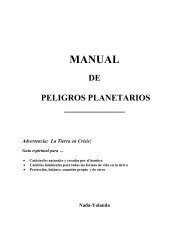ALIEN INTERVIEW - THE NEW EARTH - Earth Changes and The ...
ALIEN INTERVIEW - THE NEW EARTH - Earth Changes and The ...
ALIEN INTERVIEW - THE NEW EARTH - Earth Changes and The ...
Create successful ePaper yourself
Turn your PDF publications into a flip-book with our unique Google optimized e-Paper software.
<strong>The</strong> name Zoroaster was famous in classical antiquity, <strong>and</strong> a number of different Zoroasters<br />
- all described as having occult powers - appear in historiographic accounts.<br />
In Pliny’s Natural History, Zoroaster is said to have laughed on the day of his birth. He lived<br />
in the wilderness <strong>and</strong> enjoyed exploring it from a young age. Plutarch compares him with<br />
Lycurgus <strong>and</strong> Numa Pompilius (Numa, 4). Plutarch, drawing partly on <strong>The</strong>opompus, speaks<br />
of Zoroaster in Isis <strong>and</strong> Osiris: In this work, the prophet is empowered by trust in his God <strong>and</strong><br />
the protection of his allies. He faces outward opposition <strong>and</strong> unbelief, <strong>and</strong> inward doubt.<br />
<strong>The</strong> works of Zoroaster had a significant influence on Greek philosophy <strong>and</strong> Roman<br />
philosophy. <strong>The</strong> ancient Greek writer Eudoxus of Cnidus <strong>and</strong> the Latin writer Pliny the Elder<br />
praised Zoroaster’s philosophy as “the most famous <strong>and</strong> most useful.” Plato learnt of<br />
Zoroaster’s philosophy through Eudoxus <strong>and</strong> incorporated some of it into his own Platonic<br />
realism. In the third century BC, however, Colotes accused Plato’s <strong>The</strong> Republic of<br />
plagiarizing parts of (what is attributed to) Zoroaster’s On Nature, such as the Myth of Er.<br />
Plato’s contemporary, Heraclides Ponticus, wrote a text called Zoroaster based on<br />
Zoroaster’s philosophy in order to express his disagreement with Plato on natural<br />
philosophy.<br />
Zoroaster was mentioned by the nineteenth-century poet William Butler Yeats. His wife <strong>and</strong><br />
he were said to have claimed to have contacted Zoroaster through “automatic writing.”<br />
<strong>The</strong> 2005 edition of the Oxford Dictionary of Philosophy places Zoroaster first in a<br />
chronology of philosophers."<br />
-- Reference: Wikipedia.org<br />
166 "... an IS-BE called Ahura Mazda."<br />
"Ahura Mazda (Ahura Mazdā) is the Avestan language name for a divinity exalted by<br />
Zoroaster as the one uncreated Creator, hence God. He is the nameless "Father Asura",<br />
that is, Varuna of the Rigveda. In this view, Zoroastrian mazda is the equivalent of the Vedic<br />
medhira, described in Rigveda 8.6.10 as the "(revealed) insight into the cosmic order".<br />
Ahura Mazda is seen as the Ahura par excellence, superior to both *vouruna <strong>and</strong> *mitra, <strong>and</strong><br />
the nameless "Father Asura" of the Rigveda <strong>and</strong> is a distinct divinity. <strong>The</strong> Zoroastrian faith<br />
is thus described by its adherents as Mazdayasna, the worship of Mazda. In the Avesta,<br />
"Ahura Mazda is the highest object of worship".<br />
-- Reference: Wikipedia.org<br />
167 "Laozi, a philosopher who wrote a small book called "<strong>The</strong> Way"..."<br />
"According to tradition, it was written around 6th century BC by the Taoist sage Laozi (or Lao<br />
Tzu, "Old Master"), a record-keeper at the Zhou Dynasty court, by whose name the text is<br />
known in China. Tao Te Ching is a Chinese classic text. Its name comes from the opening<br />
words of its two sections: dào "way," <strong>and</strong> dé "virtue".<br />
This ancient book is also central in Chinese religion, not only for Taoism (Dàojiāo ) but<br />
Chinese Buddhism, which when first introduced into China was largely interpreted through<br />
the use of Taoist words <strong>and</strong> concepts. Many Chinese artists, including poets, painters,<br />
269





